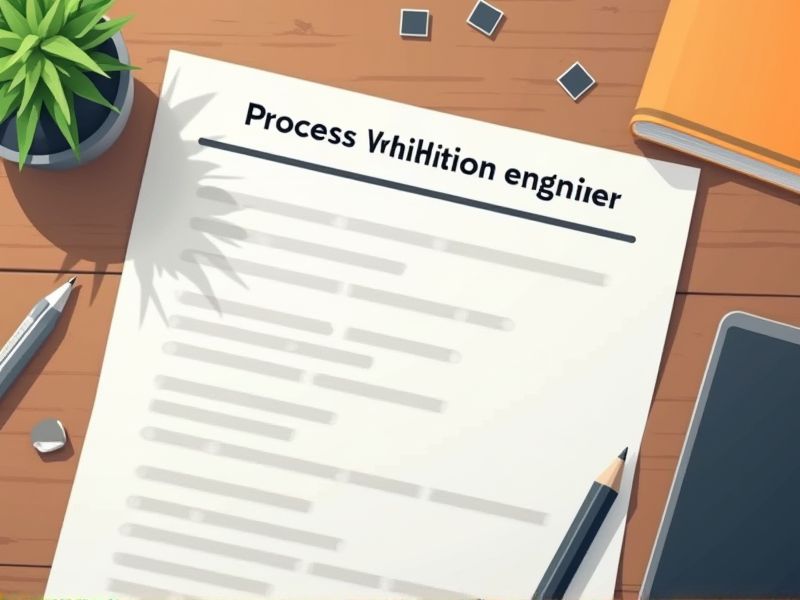
Process validation engineers operate in highly regulated environments, requiring precise adherence to industry standards. Certifications provide verification of their expertise, ensuring compliance with health, safety, and quality guidelines. With rapid advancements in technology, these certifications also signal a commitment to continuous learning and adaptation. Key certifications pivotal for process validation engineers include the following.
ASQ Certified Quality Engineer (CQE)
The ASQ Certified Quality Engineer (CQE) credential equips a process validation engineer with comprehensive quality management skills, improving their ability to ensure consistent process outcomes. This certification enhances the engineer's expertise in statistical process control and quality auditing, which are crucial for assessing and validating processes effectively. A CQE certification demonstrates a commitment to quality improvement methodologies, aligning with the goals of minimizing process defects and elevating manufacturing standards. Possessing a CQE complements a validation engineer's technical competencies, fostering a more robust understanding of quality principles essential for optimizing process efficiency.
ASQ Certified Reliability Engineer (CRE)
Companies increasingly emphasize quality assurance and risk management, prompting the need for a Certified Reliability Engineer (CRE) for Process Validation Engineers. CRE certification provides expertise in reliability risk analysis, a critical skill set for ensuring consistent quality in complex production processes. Enhanced troubleshooting capability gained through CRE certification leads to reduced downtime and improved process efficiency. Regulatory compliance becomes more manageable as a CRE-certified professional can implement and adhere to stringent industry standards effectively.
Six Sigma Green Belt Certification
Six Sigma Green Belt Certification equips process validation engineers with the tools necessary for improving operational efficiency. Mastering Six Sigma methodologies helps in reducing process variation, which directly enhances product quality. The certification provides a structured approach to problem-solving, essential for identifying root causes in validation tasks. Green Belt training instills a statistical understanding that is crucial for data-driven decision making in process validation.
Six Sigma Black Belt Certification
Achieving Six Sigma Black Belt Certification equips a process validation engineer with advanced quality management tools, enhancing the precision of validating manufacturing processes. This certification fosters a deep understanding of statistical techniques, which is critical for identifying and reducing process variability. Mastery of Six Sigma methodologies can lead to increased process efficiency, directly impacting cost reduction and product quality. Companies prefer hiring certified professionals, as they are perceived to bring a structured approach to problem-solving, leading to improved operational performance.
Good Manufacturing Practices (GMP) Certification
Good Manufacturing Practices (GMP) Certification ensures a process validation engineer possesses comprehensive knowledge of standardized quality control measures, minimizing risk in production. This certification provides assurance to employers and stakeholders that processes will consistently produce products of intended quality and safety. With GMP Certification, process validation engineers are better equipped to identify potential inefficiencies and compliance issues, fostering continuous improvement. The certification aligns engineering expertise with regulatory requirements, facilitating smoother audits and regulatory approvals.
ISO 9001 Lead Auditor Certification
ISO 9001 Lead Auditor Certification provides process validation engineers with a comprehensive understanding of quality management principles, directly enhancing their ability to establish robust validation protocols. Training in ISO 9001 auditing techniques equips engineers with skills to identify process inefficiencies, leading to improved reliability and compliance in manufacturing practices. The certification establishes credibility and increases trust among stakeholders, crucial for roles responsible for maintaining stringent quality standards. For employers, having certified professionals ensures adherence to international standards, reducing the risk of recalls and boosting customer satisfaction.
FDA Compliance Certification
Compliance with FDA regulations ensures that process validation engineers adhere to recognized quality standards, which helps maintain product safety and efficacy. Non-compliance can lead to legal repercussions and hinder a company's ability to bring products to market. Obtaining FDA compliance certification boosts credibility and trust among stakeholders, enhancing market reputation. Certification supports a structured approach to process validation, leading to consistent and reliable production outcomes.
Lean Six Sigma Certification
Lean Six Sigma certification enhances a process validation engineer's ability to systematically identify inefficiencies and reduce variability in processes. Certification provides a structured approach to problem-solving, which is critical for maintaining high standards in validation efforts. Lean Six Sigma principles align with industry demands for continuous improvement and adherence to regulatory requirements. Organizations often prefer or require certified professionals due to their proven skillset in optimizing complex systems for increased quality and efficiency.
Project Management Professional (PMP)
Project Management Professional (PMP) certification equips process validation engineers with proven methodologies to effectively manage complex validation projects, reducing the risk of project failure. It enhances their ability to plan, execute, and monitor projects, ensuring compliance with regulatory standards in industries such as pharmaceuticals and manufacturing. With PMP, engineers develop essential project management skills, including time management, budgeting, and stakeholder communication, which are critical for successful process validation. Certification serves as a formal recognition of an engineer's expertise and commitment, making them more competitive in their field and increasing opportunities for career advancement.
Certified Process Improvement Professional (CPIP)
A Certified Process Improvement Professional (CPIP) is crucial for a Process Validation Engineer, as it equips them with advanced tools and methodologies to optimize manufacturing processes. Improved process efficiency can lead to significant cost savings and heightened product quality. CPIP training emphasizes data-driven decision-making, enabling engineers to identify and mitigate potential risks in production. Certification enhances professional credibility, which can facilitate career advancement in competitive engineering fields.
Summary
You enhance your expertise and credibility in the field when you obtain certifications as a Process Validation Engineer. Employers often favor candidates with recognized certifications, leading to increased job opportunities and potential salary boosts. Certified engineers are more likely to implement effective validation processes, thereby improving product quality and compliance. This expertise often results in reduced costs for companies due to fewer errors and process inefficiencies.
